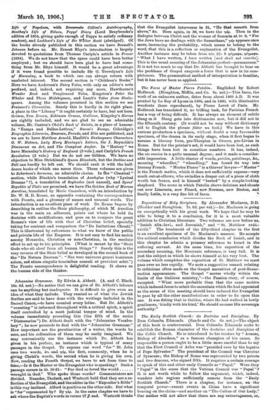Johannine Grammar., By Edwin A. Abbott. (A. and C. Black.
16s. 6d. net.)—No notice that we can give of Dr. Abbott's labours can be anything but inadequate. It is difficult to give even an idea of -what they include. They remind us of what the Jewish Scribes are said to have done with the writings included in the Sacred Canon,—to have counted every letter. But Dr. Abbott's " counting " is informed throughout with a critical spirit, a spirit itself controlled by a most judicial temper of mind. In the volume immediately preceding this (the fifth of the series "Diatessarica") Dr. Abbott dealt with the "Johannine Vocabu- lary"; he now proceeds to deal with the "Johannine Grammar." How important are the peculiarities of a writer, the words he uses, and his collocation of them may be easily imagined. We may conveniently use the instance which Dr. Abbott has given in his preface, an instance which is typical of many passages in the Gospel. To express our word "for" St. John uses two words, O'vi and Tip, the first, commonly, when he is giving Christ's words, the second when he is giving his own. Now, reading the Fourth Gospel, we have to ask from time to time,—Is it the Master or the Evangelist who is speaking? Such a passage occurs in 16-21: "For God so loved the world wrought in God." Who spoke these words? Commentators are divided. Neander, Tholnek, and Westcott hold that they are a re- flection of the Evangelist, and the editor in the "Expositor's Bible" is this way inclined. Alford is positive on the other side. But what is "for" represented by? By rip. In the same chapter we have to ask where the Baptist's words in verses 27 ff. end. Westcott thinks that the Evangelist intervenes in 31, "He that oometh from above," ate. Here again, in 36, we have the •ydp. Then in the dialogue between Christ and the woman of Samaria at iv. 9, "'For the Jews have no dealings with the Samaritans," 74 appears once more, increasing the probability, which seems to belong to the word, that this is a reflection or explanation of the Evangelist. Another instance may be taken from xix. 22: t 747pa4,a, TiTpagpa. "What I have written, I have written [and shall not rewrite]. This is the usual meaning of the Johannine perfect—permanence." It is not too much to say that Dr. Abbott has brought to bear on the problems of Gospel exegesis a force that is new in its com- pleteness. The grammatical method of interpretation is familial., but it has never been so applied.










































 Previous page
Previous page